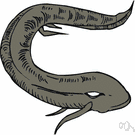craniate
(redirected from Craniates)Also found in: Thesaurus, Medical, Encyclopedia.
cra·ni·ate
(krā′nē-ĭt, -āt′)n.
Any of numerous animals having a cranium of bone or cartilage, including all vertebrates and the hagfishes.
adj.
Having a cranium.
American Heritage® Dictionary of the English Language, Fifth Edition. Copyright © 2016 by Houghton Mifflin Harcourt Publishing Company. Published by Houghton Mifflin Harcourt Publishing Company. All rights reserved.
craniate
(ˈkreɪnɪɪt; -ˌeɪt)adj
(Anatomy) having a skull or cranium
adj, n
(Zoology) another word for vertebrate
Collins English Dictionary – Complete and Unabridged, 12th Edition 2014 © HarperCollins Publishers 1991, 1994, 1998, 2000, 2003, 2006, 2007, 2009, 2011, 2014
cra•ni•ate
(ˈkreɪ ni ɪt, -ˌeɪt)adj.
1. having a cranium or skull.
n. 2. a craniate animal.
[1875–80]
Random House Kernerman Webster's College Dictionary, © 2010 K Dictionaries Ltd. Copyright 2005, 1997, 1991 by Random House, Inc. All rights reserved.
ThesaurusAntonymsRelated WordsSynonymsLegend:
Switch to new thesaurus
| Noun | 1. |  craniate - animals having a bony or cartilaginous skeleton with a segmented spinal column and a large brain enclosed in a skull or cranium craniate - animals having a bony or cartilaginous skeleton with a segmented spinal column and a large brain enclosed in a skull or craniumfetus, foetus - an unborn or unhatched vertebrate in the later stages of development showing the main recognizable features of the mature animal chordate - any animal of the phylum Chordata having a notochord or spinal column Craniata, subphylum Craniata, subphylum Vertebrata, Vertebrata - fishes; amphibians; reptiles; birds; mammals Amniota - higher vertebrates (reptiles, birds and mammals) possessing an amnion during development amniote - any member of the Amniota aquatic vertebrate - animal living wholly or chiefly in or on water gnathostome - a vertebrate animal possessing true jaws bird - warm-blooded egg-laying vertebrates characterized by feathers and forelimbs modified as wings amphibian - cold-blooded vertebrate typically living on land but breeding in water; aquatic larvae undergo metamorphosis into adult form reptile, reptilian - any cold-blooded vertebrate of the class Reptilia including tortoises, turtles, snakes, lizards, alligators, crocodiles, and extinct forms mammal, mammalian - any warm-blooded vertebrate having the skin more or less covered with hair; young are born alive except for the small subclass of monotremes and nourished with milk tetrapod - a vertebrate animal having four feet or legs or leglike appendages belly - the underpart of the body of certain vertebrates such as snakes or fish tail - the posterior part of the body of a vertebrate especially when elongated and extending beyond the trunk or main part of the body caudal appendage - tail especially of a mammal posterior to and above the anus costa, rib - any of the 12 pairs of curved arches of bone extending from the spine to or toward the sternum in humans (and similar bones in most vertebrates) blood - the fluid (red in vertebrates) that is pumped through the body by the heart and contains plasma, blood cells, and platelets; "blood carries oxygen and nutrients to the tissues and carries away waste products"; "the ancients believed that blood was the seat of the emotions" ovary - (vertebrates) one of usually two organs that produce ova and secrete estrogen and progesterone chest, pectus, thorax - the part of the human torso between the neck and the diaphragm or the corresponding part in other vertebrates pedal extremity, vertebrate foot - the extremity of the limb in vertebrates endoskeleton - the internal skeleton; bony and cartilaginous structure (especially of vertebrates) |
Based on WordNet 3.0, Farlex clipart collection. © 2003-2012 Princeton University, Farlex Inc.